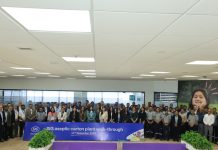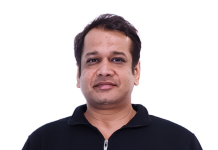A partnership between the Olympic Refuge Foundation (ORF) and the Deutsche Gesellschaft für Internationale Zusammenarbeit (GIZ) has enabled more young refugees in Uganda to benefit from a programme that aims to strengthen their mental health and well-being, in a context aggravated by the COVID-19 pandemic.
The Game Connect project was launched in August 2020 and is being run in collaboration with the AVSI Foundation, Right to Play, Youth Sport Uganda, the Uganda Olympic Committee, and the United Nations High Commissioner for Refugees (UNHCR).
The programme aims to deliver structured sport-for-protection activities to increase the resilience of more than 10,000 vulnerable youth aged from 15 to 24 in refugee camps in Kampala, Kamwenge, Lamwo and Adjumani, while also promoting a culture of peace and social cohesion between the refugees and members of the host communities.
Thanks to the support of GIZ, the programme has been expanded to the Kyangwali refugee settlement in the Kibuube District of western Uganda, with more than 1,620 participants including refugees, members of the host community and young people with a disability set to benefit from the expansion of the project.
Mitigating the impact of the COVID-19 pandemic in vulnerable communities
In particular, GIZ and the ORF established this partnership to mitigate the impact of the COVID-19 pandemic in this community, with refugees among the most vulnerable to the consequences of the global health crisis often residing in overcrowded camps, settlements and urban areas in cramped conditions with inadequate access to fresh water and hygiene supplies.
The Game Connect project uses a variety of sports activities and games to help participants acquire skills and strategies to support their own mental health and psychosocial well-being, while also learning how to apply these skills in their daily lives. In addition, parents and community leaders are educated about the topic of mental health, creating a sustainable social support network.
Helping young refugees to set goals
Atong Aluel, a 14-year-old refugee from South Sudan living in a settlement in Kampala, is among those to have already benefited from the Game Connect programme. Aluel fled her home country, after losing both her parents, in the hope of finding a stable life and education in Uganda.
She says she has learnt a lot from the Game Connect sessions, and her perspective on life has changed. My favourite life skill is goal-setting, she says. I have set a long-term goal of becoming a bank manager. My short-term goal is to join the volleyball team because I love the game very much.
Aluel also says she has been able to make many friends through the Game Connect activities, including Sonia, a Ugandan girl, who has taught her many things about her adopted home.
With more than 82 million forcibly displaced people like Aluel around the world, the need to help young people affected by displacement to thrive through sport is more relevant than ever.
The power of partnerships
Created in 2017, the Olympic Refuge Foundation marks the next chapter in the International Olympic Committees long-term commitment to supporting refugees through sport 365 days a year. The Olympic Refuge Foundation uses sport to improve well-being and connection and create opportunities for young people affected by displacement. Currently, up to 200,000 young people have been reached by sports programmes delivered with partners in six countries. The Foundation aims for 1 million young people affected by displacement to access safe sport by 2024.
GIZ, on behalf of the German Federal Ministry for Economic Cooperation and Development (BMZ), is using sport as a tool to create opportunities for children and young people and to contribute to designated Sustainable Development Goals (SDGs) such as good health, quality education, gender equality, employment, social inclusion and peaceful coexistence. Since 2013, GIZ, together with its partners, has reached over 1.2 million children and young people through 50 development projects in almost 40 countries and trained more than 7,500 trainers and facilitators all around the world.
Through their partnership, both the ORF and GIZ hope to make a positive impact on the lives of young refugees in Uganda, and look forward to exploring further collaboration and synergies in the future.





